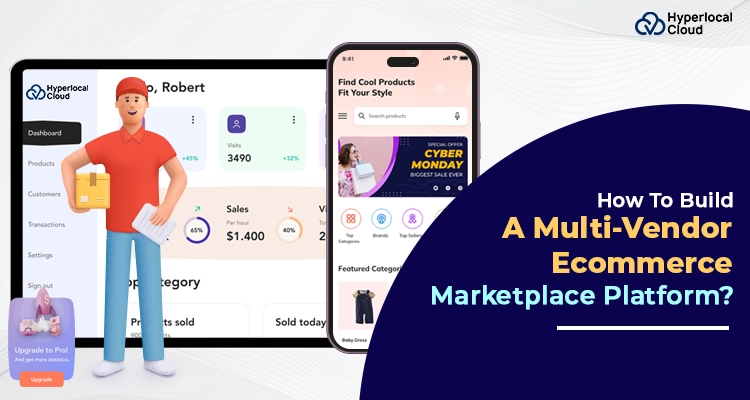How To Build A Multi-Vendor Marketplace

Multi-vendor marketplaces have completely changed the way we buy goods online. Platforms like Amazon, Etsy, and Alibaba have essentially transformed the process of simple transactions into full-fledged shopping experiences where innumerable sellers can meet millions of buyers in no time. What used to be the process of visiting multiple stores is now just a click away.
The digital revolution is not only convenient for consumers—it’s a dream come true for entrepreneurs and businesses. When you create your own marketplace, it is like you have made a living network where you can link buyers and sellers, make money from every transaction, and grow without the need to keep stock.
As online shopping is expected to be the main trend in retail in the future, starting a multi-vendor platform is a way to open the door to an almost unlimited number of opportunities for your business to grow gradually but steadily and expand without limit.
How about we figure out the steps of creating such a platform? Let’s begin!
Overview Of Multi-Vendor Marketplace
A multi-vendor marketplace is an online platform allowing various independent sellers to display and sell their goods or services in one collective digital store, similar to a shopping mall but online. The owner of the marketplace takes care of the platform, the payments, and the rules, whereas the sellers manage their stock, set the prices, and deliver the goods by themselves.
If you are a business or startup looking to invest in a multi-vendor marketplace solution, check out some of the best multi-vendor marketplace platforms that you can consider.
Start Building Your First Vendor Store
Major Forms Of Multi-Vendor Marketplace Platforms
The table below shows the different types of multi-vendor marketplace platforms. Let us understand that:
| Type | Description |
| B2C Marketplace | It is a platform through which vendors can access customers. Such platforms, such as Amazon and eBay, are examples where retailers are selling directly to regular shoppers. |
| B2B Marketplace | A B2B marketplace is a platform that helps businesses trade easily with each other. Manufacturers and wholesalers can sell large quantities of products to other businesses that are looking for the inventory or supplies. |
| C2C Marketplace | The platforms where consumers can sell to other consumers are C2C marketplaces that enable individuals to buy and make sales. eBay, Craigslist, and Facebook Marketplace are the platforms where consumers can sell and purchase their products. |
| Service Marketplace | A service marketplace is a site to match the providers of a given service with customers seeking that specific service/skill. The freelancers can find the people who require a task to be done on Upwork, Fiverr, and TaskRabbit. |
| Rental Marketplace | The rental marketplace is a platform where the owner of the assets can rent them out temporarily to other people. Airbnb for properties and Turo for vehicles are the perfect examples of the rental marketplaces. |
| Vertical Marketplace | A vertical marketplace is a business or platform that focuses on a specific industry or niche. An example is Etsy, which deals in the sale of handmade items, and Houzz, which only deals with the home improvement business. |
| Horizontal Marketplace | Such platforms provide product categories from different industries to the customers. Examples of such platforms are Amazon and Alibaba, which deal in everything from electronics to groceries. |
| Hyperlocal Marketplace | Hyperlocal marketplaces enable customers to buy items from local sellers. The primary mission of apps such as DoorDash and Instacart is to help with both transactions and deliveries in the local neighborhood. |
Workflow Of A Multi-Vendor Marketplace
A multi-vendor platform works by connecting consumers with various independent sellers who are managing their storefronts and products on a single marketplace.
1. Vendor Registration & Onboarding
Vendors enroll, build accounts, and after submitting all documents for the inspection, they are allowed to start listing their goods on your website.
2. Product Listing & Catalog Management
Vendors list their products with full details such as descriptions, photos, prices, and stock, and their marketplace becomes an easily accessible and searchable catalog for the buyers.
3. Customer Browsing & Search
Consumers come to the platform, look through the products of several suppliers, do a product comparison, and put together orders from various sellers.
4. Order Placement & Payment Processing
Customers take the final step in the buying process through a secure checkout. The payments are done in one place by the platform, and then they are handed over to vendors after deduction of the platform’s share.
5. Order Management & Fulfillment
The vendors will receive orders for their products in the system, they will deal with updating the stock, and then be responsible for packing and delivering to their customers.
6. Commission & Payment Distribution
From every transaction, the platform gets its commission automatically, and the leftover money becomes the vendors’, for example, bank accounts, according to the settlement cycles agreed upon beforehand.
7. Tracking & Customer Support
Consumers can monitor the deliveries as to time and location, whereas the platform handles the customer service, supports requests, returns, and solves grievances in a great manner.
How Multi-Vendor Marketplaces Drive Business Growth
The table below explains how the multi-vendor marketplaces drive growth for businesses:
| Benefits | Description |
| Increased Traffic and Reach | A large number of sellers and products will simply drive more customers, and this is a network effect where the number of sellers increases the number of customers and vice versa. |
| Rapid Scalability | The marketplace is scalable exponentially since it does not have the burden of operation by having to maintain a large inventory of vendors. |
| Diverse Revenue Streams | Different sources of revenue are generated, such as commission on sales, vendor subscriptions, listing fees, and advertising. |
| Lower Operational Burden | The marketplace is a facilitator and does not need to dispose of individual product inventory, supply chain, or fulfillment; the tasks of the vendors |
| Data-Driven Insights | The platform will get useful information about customers and vendor behavior, which can be implemented as strategic decisions and personalized marketing. |
| Enhanced Credibility | A platform consisting of numerous vendors and having a large range of products can earn more trust and credibility among customers than a one-vendor store. |
Marketplace Features Supporting Multiple Independent Vendors
Typically, a multi-vendor platform present on the marketplace site consists of three user panels, each of which has its own set of features aimed at the appropriate user: the Admin Panel (marketplace owner), the Vendor Panel (sellers), and the Customer/Buyer Interface (end users).
Admin Panel Features
1. Vendor Management
This feature allows the admin to perform tasks such as vendor onboarding, approval, management, and performance live tracking of the vendors.
2. Commission Management
The option enables the admin to set flexible, multi-level commissions (fixed or percentage-based) and manage vendor payments, including automated split payment systems.
3. Product Approval & Management
The vendors present their products to the admin, who inspects them based on their quality and gives approval to be put in the storefront. In addition, the administration is allowed to add, edit, or delete products.
4. Order Management System
The admin has a centralized system to view all orders, order status, split orders (different vendors on one purchase), as well as returns and refunds.
5. Reports & Analytics
This will give access to the admin to informative dashboards and sales reports to provide an overview of such metrics as sales, customer behavior, inventory location, campaign performance, etc.
6. Content & Design Management (CMS)
The package is aimed at the management of the site content (Blogs, FAQ, terms and conditions), design, and promotional materials (ads and banners).
7. Security & Compliance
This feature allows the admin to manage user roles, access levels, and security options, including the use of an SSL certificate to offer a secure platform.
8. Payment & Shipping Management
This configuration includes multiple payment gateway arrangements and logistics and shipping providers arrangements by the admin.
Vendor Panel Features
1. Personalized Dashboard & Storefront
A customized sales, orders, and inventory management dashboard as well as a personalized mini-storefront to display the vendor’s brand and products.
2. Product & Inventory Management
Vendors can add/edit/delete products. They can edit real-time inventory (stock) and product variants (size and color), and use bulk product upload features.
3. Order & Shipping Management
This feature provides vendors with real-time visibility into received orders, order status, invoice preparation, shipping method, and tax calculation.
4. Payment & Payout Tracking
Using the payment and payout tracking feature, vendors can have a clear view of their income, commissions billed, and planned payouts.
5. Communication & Support Tools
Vendors have the opportunity to interact with customers (e.g., post-sale services, order confirmation) and provide support with the assistance of the administration.
6. Marketing & SEO Tools
Vendors can conduct the promotion, control all campaigns (e.g., discount coupons), and promote product entries using SEO elements.
7. Performance Analytics
Sales data and customer information will be available to vendors to study performance and improve selling strategies.
Customer Panel Features
1. Easy Navigation & Advanced Search
This feature provides users with a user-friendly interface and powerful search, filtering (price, brand, ratings), and category search.
2. User Accounts & Profiles
The user accounts and profiles feature allows users to securely sign up/log in and manage profiles, addresses, orders, and wishlists.
3. Product Information & Comparison
Product pages and comparison features provide users with detailed information. There is a clear rating and review system to establish trust and assist the decision-making process.
4. Unified Cart & Seamless Checkout
The unified cart & seamless checkout feature allows users to add products to their cart and complete checkout with ease.
5. Order Tracking & Notifications
Using order tracking and notifications allows users to track orders in real-time and receive notifications of status through email or SMS.
6. Multiple Payment Options
Users can easily pay using a range of safe payment gateways and multi-currency capabilities, offering options for an international clientele.
7. Deals & Personalization
Users will be updated on daily deals, gift cards, coupons, and personalized product recommendations.
Launch Your Vendor Platform in Weeks
AI Innovations Enhancing Multi-Vendor Commerce Experiences
Have a look at the points below, which are some advanced AI features that businesses or startups can implement in their multi-vendor platform.
➢ Personalized Recommendations
AI examines the user information to make suggestions, which may raise the average order value.
➢ Intelligent Search
It uses AI, including Natural Language Processing (NLP), to understand the intent of the user better to locate a product in a more efficient and faster manner.
➢ Dynamic and Predictive Pricing
The algorithms change the prices dynamically on the basis of the demand, the competition, and the marketplace tendencies to get maximum income.
➢ Personalized Promotions
This AI capability will come up with customized discounts and offers in order to enhance the level of customer engagement and customer loyalty.
➢ AI-powered Chatbots and Virtual Assistants
This aspect will save customer wait time and provide them with personal assistance by taking them through the shopping route.
➢ Automated Product Listing
AI is able to create product titles and descriptions based on the picture uploaded, which can be reviewed and edited by sellers.
➢ Smart Inventory Management
The smart inventory management assists in predicting demand and optimizing inventory to avoid inventory shortages or excess inventory.
➢ Predictive Analytics
The predictive analytics AI feature offers information to the vendor on sales patterns, performance, and growth.
➢ AI Agents for Support
AI agents may be used to help vendors perform tasks such as onboarding and managing their storefronts.
➢ Fraud Detection
AI detects and notifies of suspicious activity to defend the platform against fraudulent deals.
➢ Smart Vendor Matching
Assists in matching buyers with the most appropriate vendors according to a number of criteria.
➢ Automated Content Generation
This feature uses generative AI; it can be used to assist in marketing writing or copywriting a product.
➢ Demand Forecasting
Assists in the marketplace in predicting demand to enable them to manage supply and supplier fulfilment.
➢ Real-Time Monitoring
It will give the administrators live data and notifications to have more awareness of how the operations are happening.
Complete Roadmap For Developing a Multi-Vendor Marketplace App
The process of creating a multi-vendor app follows the steps below, which businesses should follow to create a scalable, easy-to-use app.
1. Define Your Niche & Business Model
A number of choices are available to decide on, including the identification of the target market, the type of vendors that will be recruited, and the type of revenue model, whether commissions, subscription fees, or through listing fees.
2. Design a User-Friendly Interface
Design user-friendly interfaces of three types, including customers who browse and purchase, vendors who manage stores, and admins who control the whole platform.
3. Develop the App
Now comes the part where the online marketplace app development is done. Businesses need to create an app to offer services to their target audience. They need to choose one of two development ways: a custom-based solution or a white-label solution.
If choosing a custom-based solution, it will require more time and investment. In this process, the app will be developed from scratch. Another is a white-label solution; if you choose this, then you can launch your app within a week or two in the market. This requires less investment as the solution is pre-built and tested by the provider.
4. Test Thoroughly & Launch MVP
Carry out massive bugging, security testing, and user experience testing so as to roll out a minimum viable product, to obtain real feedback on users. You may utilize the assistance of beta testers and the early adopters, and this will assist you in testing the core value proposition of the app for a small-scale launch.
5. Monitor, Optimize & Scale
Continue to test the performance of your platform, take feedback on the same with your vendors and customers, fix bugs in time, and add features as your marketplace grows.
Multi-Vendor Marketplace Development Challenges and Their Practical Solutions
Businesses might encounter challenges when planning to launch a multi-vendor marketplace. These challenges can be overcome as presented in the table below:
| Challenge | Solution |
| Vendor Quality Control | Introduce a comprehensive vendor audit system, rating system, frequent performance assessment, and definite quality standards to ensure quality in the marketplace and trust among customers. |
| Payment Processing & Commission Management | Use automated payment gateway integrations to divide transactions precisely, adjust commissions immediately and pay vendors in a regular manner without the need to do it manually. |
| Inventory & Order Management Complexity | Implement centralized dashboard solutions of real-time inventory conducted on a vendor-by-vendor basis, automated ordering routing to the appropriate sellers, and prevent excessively selling items by displaying inventory in real-time. |
| Trust & Security Concerns | Add in place of these, SSL certificates, secure payment gateways, fraud detection, buyer protection policies, and transparent dispute resolution mechanisms in order to generate user confidence. |
| Platform Scalability Issues | Select a cloud-based infrastructure that can be easily scaled in terms of server capacity, optimize database structure, and implement CDN services to cope with the growing traffic and vendors smoothly. |
| Customer Support Coordination | Create a single support system using ticketing software, outline the responsibility of vendors, and have a team that responds to queries, returns, and conflicts. |
Request a Personalized Marketplace Demo
Understanding Revenue Sources In Multi-Vendor Platforms
There are a lot of ways in which businesses can earn revenue. We have described below some of the main revenue sources in a multi-vendor platform.
1. Commissions
Charging a commission on every sale made by a vendor on the site is a common practice for businesses.
2. Subscription/Membership Fees
The vendor is charged a periodic subscription fee to access the marketplace or enhanced services.
3. Transaction Fees
A fee will be charged per payment made using the platform, usually with a commission.
4. Sponsored Listings
The vendors will be able to pay to have their products featured in the search or on certain pages.
5. Advertising
Businesses can place advertisements for third-party businesses on their marketplace to make money.
6. Listing Fees
Collecting a fee from the vendors on every product that they list on the marketplace.
7. Logistics and Shipping Services
Businesses can charge vendors for the convenience of handling packaging and shipment.
8. Premium Services
Offering premium plans or features to both vendors and customers for a fee, such as advanced analytics or faster shipping options for customers.
In Conclusion!
Creating a multi-vendor marketplace that is successful involves meticulous planning, making wise technology choices, having the necessary features, and being scalable. We at Hyperlocal Cloud are the top multi-vendor marketplace app development company, with expertise in building platforms that are a win-win situation for vendors and customers. Want to launch your own marketplace? Contact us today to talk about your requirements and make your dream venture a reality.





